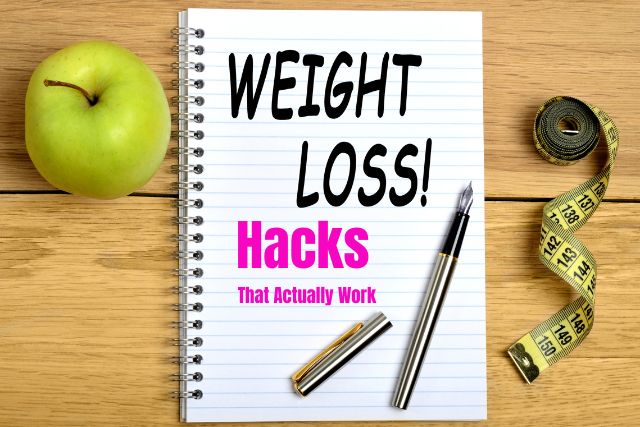Explore effective, science-backed weight loss hacks for shedding pounds and embracing a healthier lifestyle. Uncover the best weight loss tips that actually work.
Do you wish to lose weight but feel too lazy for gym commitment? You’re not alone. Embarking on a weight loss journey doesn’t have to mean grueling hours at the gym or surviving on bland salads.
It’s about uncovering clever and effective hacks that align with your lifestyle. I mean something as simple as learning to tap into your everyday activity can make tremendous progress in your weight management.
In this guide, we’ll unveil a treasure trove of lazy girl weight loss hacks perfect for those who crave results without the intense gym sessions.
These aren’t your typical crash diets or extreme workouts—instead, we’ll explore practical and sustainable strategies that fit seamlessly into your daily routine.
Get ready to discover the secrets to shedding those pounds while maintaining your sanity and enjoying the process.
12 Lazy Girl Weight Loss Hacks That Actually Work
1. Consume Apple Cider Vinegar With the Mother Before Meals
Apple cider vinegar, best known as (ACV), comes from fermented apples, yeast, and sugar. Scientifically, ACV is known for many benefits, including food preservation and improving skin care function.
But that is not all.
Consuming organic Apple cider vinegar before meals may be one of the best weight-loss hack when appropriately used.
According to research, ACV can lower blood sugar, especially when consumed before eating a high-carb meal.
Apple cider vinegar (ACV) with the “mother” is believed to aid in weight loss by slowing the stomach emptying rate, preventing blood sugar spikes and reducing fat storage.
The “mother” refers to the cloudy, unfiltered portion of vinegar containing beneficial bacteria and enzymes.
Drinking two teaspoons or one tablespoon of diluted ACV before meals may help with weight loss due to its potential effects on metabolism, appetite, and blood sugar levels.
Some studies suggest that acetic acid, a component in ACV, could promote feelings of fullness, leading to reduced calorie intake. The acetic acid might also help regulate blood sugar levels, potentially lowering insulin levels and aiding fat burning.
How do you use apple cider vinegar for weight loss?
Take 1–2 tbsp (15–30 mL) of organic apple cider vinegar, preferably with mother. Mix it in a glass of water and take at least 30 minutes before meals daily.
You may also dress your salads with ACV for better results.
Should I drink ACV before or after a meal?
The ideal time to consume apple cider vinegar (ACV) is before a meal, typically around 20-30 minutes beforehand. Doing so might help in appetite suppression. It also improves digestion by increasing stomach acidity, which could help with the breakdown of food and help moderate blood sugar levels after eating. This is especially crucial for individuals with insulin sensitivity issues.
Who should not take Apple cider vinegar?
- apple cider vinegar contains acetic, which is acidic. This acid content can irritate your stomach lining and contribute to acid reflux. As such
- avoid ACV if you have existing stomach ulcers
- Ensure you dilute your ACV with water before you drink.
- Rinse your mouth with clean water after drinking ACV solution to avoid damaging your tooth enamel.
Related:
7 Hacks To Help Stop Sugar Cravings For Good
2. Lemon Water Before Meals
Lemon water isn’t just a refreshing drink— I mean, we use it every day for various reasons. Its acidity is a sure bet for preventing the browning of fruits like avocados when soaked or dipped. The citric acid in lemon water slows down the oxidation process, keeping these fruits looking fresh for longer. Just a hack for you!
But is this all about lemon water? Definitely no.
Taking Lemon water before meals is also one of the best weight loss hacks that actually work
Lemons consist of antioxidants ascorbic acid, hesperidin, naringin, and ferulic acid. Studies show these antioxidants can effectively reduce body fat and help manage your overall weight.
Additionally, citrus flavonoids have also been shown to increase metabolism and prevent weight gain and fat accumulation.
Some people believe drinking lemon water before a meal can help reduce overeating. It creates a feeling of fullness, potentially leading to consuming fewer calories.
How do you make lemon water for weight loss?
- Take a glass of warm water
- Add lemon juice(from 3 medium-sized lemon fruits)
- Drink at least 30 mins before your main meal.
Just like ACV, lemon water is acidic and may not be favourable to people with ulcers. Also, be sure to use a straw and rinse your mouth to prevent your teeth from eroding.
3. Drink Green Tea with Lemon Juice
Drinking green tea with lemon juice is often considered one of the best weight loss hacks for lazy girls like me.
Why?
As you seep this soothing beverage any time of day, you get to enjoy the unending benefits of the compounds found in it.
Research suggests that green tea contains antioxidants, mainly epigallocatechin gallate (EGCG), quercetin, and chlorogenic acid. In this study, the EGCG was strongly linked to reduced body fat and weight.
And not just that.
In a study involving about 115 women, taking Green tea for 12 weeks proved effective in reducing body weight and belly fat.
On the other hand, lemons consist of citrus flavonoids, which are also shown to increase metabolism and prevent fat accumulation.
Studies have shown that some of these antioxidant compounds can decrease body weight and body mass index values.
How does drinking green tea with lemon help with weight loss?
Drinking green tea with lemon will help increase metabolism and promote fat oxidation. Combining green tea and lemon helps suppress appetite and improve digestion, leading to weight loss. The antioxidants in green tea and the vitamin C in lemon could contribute to feelings of fullness, potentially reducing calorie intake.
Lemon juice, with its citric acid content, might aid digestion by stimulating the production of digestive enzymes. At the same time, green tea’s compounds could support gut health, leading to better digestion and nutrient absorption.
Related:
10 Warning Signs That You’re Actually Eating Too Much Sugar
4. Stop Eating When You are 80 Per cent Full
Stopping eating when you’re about 80 per cent full is a practice known as “Hara Hachi Bu” in Japanese culture. This practice originated in the city of Okinawa, where people have one of the lowest rates of lifestyle illnesses like stroke and heart disease.
This is what “Hara Hachi Bu” advocates
- By looking at your plate, decide how much food might make you feel full.
- Then eat an estimated of 80% of that amount
- The aim is not to be full but rather not feel hungry anymore
The big catch when practising “Hara Hachi Bu” is to eat slowly.
Slowing down while eating gives your body time to register how much you’ve eaten so you don’t go beyond 80% full.
This mindful approach to eating allows your body to register satiety cues before overeating, giving your brain time to catch up with your stomach.
By pausing before reaching fullness, you’re giving your body a chance to recognize the signals that indicate you’ve had enough. This prevents you from consuming excess calories.
This habit not only aids in weight management by naturally controlling portion sizes but also supports better digestion and overall well-being.
Moreover, it fosters a deeper connection with your body’s hunger and fullness signals. This promotes a more mindful and balanced approach to eating, leading to a healthy weight in the long run.
5. Walk for at Least 10 Minutes After Meals
Many studies suggest that walking for at least 10 minutes after meals can stimulate digestion by encouraging movement in the gastrointestinal tract.
This movement efficiently propels food through the digestive system, reducing the likelihood of discomfort or bloating after eating.
But you may wonder, are there scientific evidence for this claim?
Well,
A recent study shows that taking a 10-minute walk after meals can help regulate blood sugar levels, boost your metabolism and encourage calorie burning.
Furthermore, walking is a form of physical exercise best known to promote calorie expenditure.
What is the ideal time to walk as a weight loss hack?
One study suggests that you should walk immediately after a meal. Post meal walks are effective in stimulating digestion and improving blood sugar regulation.
Be sure to tag a friend when you embark on this noble cause of post meal walks, especially after dinner.
6. Enhance your Metabolic Switch Through Intermittent Fasting
Intermittent fasting involves alternating eating and non-eating durations. And the main aim is to trigger a metabolic switch that contributes significantly to weight loss.
One study shows that short-term fasting may improve your metabolism and reduce the likelihood of obesity.
During short-term fasting, the body’s primary energy source shifts from glucose to stored fats.
This transition occurs due to depleted glucose reserves, prompting the body to break down fat stores for fuel, a state known as ketosis.
This metabolic shift leads to increased fat burning, supporting weight loss efforts.
Additionally, intermittent fasting can impact various hormones related to hunger, satiety, and metabolism.
For instance, insulin sensitivity tends to improve during fasting periods. This may aid in better blood sugar regulation and potentially reducing the risk of insulin resistance and weight gain.
Furthermore, fasting can increase levels of norepinephrine, a hormone that plays a role in fat breakdown.
Related:
Discover 14 Ancient Secrets to Losing Weight and Stay Healthy Without Toiling
7. Walk Around When Stressed
Walking when stressed is one of the little-known weight loss hacks that helps you maintain a good body shape.
For many years walking when stressed or under pressure was seen as mindful distraction. You were told to walk around to prevent stress-induced emotional eating or unhealthy snacking, which are common responses to distress.
Recently, medics advocated for people to walk around when stressed as a weight management measure.
Why?
When stressed, the body releases cortisol, a hormone that can increase fat storage, particularly in the abdominal area.
By engaging in physical activity like walking, the body can reduce cortisol levels, potentially mitigating its impact on weight gain.
According to Science Direct, physical activity decreases cortisol levels. Walking as low as 20 minutes when stressed can help support your weight loss journey effortlessly.
8. Check the Choice of Meals After 9 p.m.
According to your circadian rhythm, you should eat in daylight as nighttime is for resting.
Late-night eating can highly impact your body’s metabolism. The body’s metabolism tends to slow in the evening, making it less efficient at processing calories.
As such;
The types of foods typically consumed late at night when you’re at rest can be more prone to being stored as fat due to reduced activity and the body’s circadian rhythms.
Instead of carbs and sugary food, snack on a banana or salad with ACV. Also, Have your nighttime tea concoctions you can take one hour before sleeping to support your weight loss efforts.
Additionally, late-night eating might disrupt sleep patterns, affecting hormone levels regulating hunger and satiety.
Poor sleep quality can lead to increased cravings for unhealthy foods and interfere with the body’s ability to properly process and regulate appetite hormones.
As a rule of thumb, eat three hours before going to bed. If you’re caught after 9.00 pm, try to be mindful of food choices and portion sizes.
Related:
Night Routine For Weight Loss: 10 Critical Lessons I learned from The Japanese People
9. Re-check the Order of the Food on Your Plate
The order by which you eat your food may be the first enemy in your weight loss journey. As a rule of thumb, eat vegetables first, then protein, and finish with carbs.
According to a publication in NIH, eating your vegetables first may be one of the little-known weight loss hacks for women. This study suggests, eating your vegetables first and carbohydrates last helps to prevent a spike in blood glucose and insulin concentrations in your blood, which can trigger fat storage.
Vegetables are low in calories but high in fibre, vitamins, and minerals. Their high fibre content contributes to a feeling of fullness and satiety, helping you consume fewer calories overall during the meal.
By filling up on vegetables first, you’re more likely to eat a smaller portion of higher-calorie proteins and carbs.
In fact, some studies suggest that when you eat vegetables first, your body secrete higher levels of GLP-1, a hormone popular in most weight loss drugs. When GLP-1 hormone is produced in the gastrointestinal, you tend to feel fuller for a long time.
Additionally, the water content in vegetables contributes to hydration and adds volume to your meal without significantly increasing calorie intake.
10. Eat Complex Food to Avoid Spiking Your Sugar
Eating complex foods like whole grains, vegetables, and legumes is the best hack for weight loss.
Complex foods are often high in fibre, which helps you feel full for long hours. This can reduce overall calorie intake by decreasing the likelihood of overeating between meals.
Also, the body takes longer to break down complex foods due to their structure and fibre content.
This slower digestion can lead to a more gradual release of energy, preventing rapid spikes in blood sugar levels. Stabilized blood sugar reduces the likelihood of storing excess energy as fat.
Additionally, eating complex foods high in protein requires more digestion energy, temporarily increasing your metabolism.
Unlike simple carbohydrates (found in processed foods and sugary snacks), complex foods provide a more sustained release of energy. This steadier energy supply can support a more active lifestyle, aiding weight management.
Related:
When You See These Symptoms, Know That You May Be Eating Too Much Sugar
11. Learn to Keep Your Vagal Tone High
Increasing vagal tone, which refers to the activity of the vagus nerve, can have various positive effects on your body. It can help reduce stress, improve digestion, and enhance mood.
Vagal tone is a marker of the balance between the sympathetic (fight-or-flight) and parasympathetic (rest-and-digest) branches of the autonomic nervous system.
A well-regulated autonomic nervous system can support overall metabolic health and contribute to maintaining a healthy weight.
Higher vagal tone is associated with lower stress levels. Stress can lead to emotional eating or cravings for unhealthy foods high in sugar and fat.
Besides increasing your vagal tone after meals, it has been associated with improved digestion.
Why? Because the vagus nerve controls food movement and the digestive enzymes release through the digestive tract.
Optimal vagal tone can enhance digestion and nutrient absorption, which may indirectly support weight management by ensuring efficient metabolism and utilization of nutrients.
So, how do you ensure that your vagal tone remains high most of the time?
- Do more of deep breathing exercises like diaphragmatic breathing.
- Engage in meditation and Mindfulness practices
- Engage in certain yoga poses, such as intense, relaxed breathing and gentle stretches, to stimulate the vagus nerve and increase its tone. Restorative or yin yoga practices are particularly beneficial.
- Cold exposure: Briefly exposing yourself to cold, such as splashing cold water on your face or taking cold showers, can activate the vagus nerve and improve its tone.
- Singing, chanting, or humming: Activities that involve using your voice, like singing, chanting, or even humming, can stimulate the muscles in the throat connected to the vagus nerve, potentially increasing its tone.
- Regular exercise: Moderate exercise, like walking, swimming, or cycling, can positively influence vagal tone. It’s believed that regular physical activity can enhance overall nervous system function.
- Have regular Positive social interactions, and laughter.
12. Tap Into Your Everyday Activities To Burn Fats
Embracing your everyday activities to burn calories may be one of the best weight loss hacks that work without struggle.
For instance, walking is a great way to burn calories. Try taking the stairs instead of the elevator. you may also consider parking farther away from your destination, or going for a brisk walk during breaks.
Additionally try to engage in doing household chores. I mean simple daily activities like vacuuming, cooking, playing with the kids or pet, mopping, and dusting can help burn calories.
The more vigorously you clean, the more calories you’ll burn.
Takeaway
In the pursuit of weight loss, the bombardment of trends and tricks often overshadows the genuine methods that yield tangible results. Exploring these weight loss hacks has been eye-opening that drastically boosted my weight management effort, revealing a treasure trove of strategies that actually work.
DISCLAIMER The information contained in this post is for general information purposes only. I’m not a health practitioner and as such, this information should not be used as a substitute for consultation with your professional service provider.
Up Next
- 7 Powerful Natural Remedies To Get Rid of Vaginal Yeast Infection in Just 3 Days
- 8 Things Health-Conscious Women Do To Prevent Urinary Tract Infections
- Lazy Girl Guide for Getting Things Done On Time-Every Time




